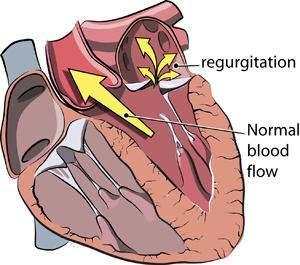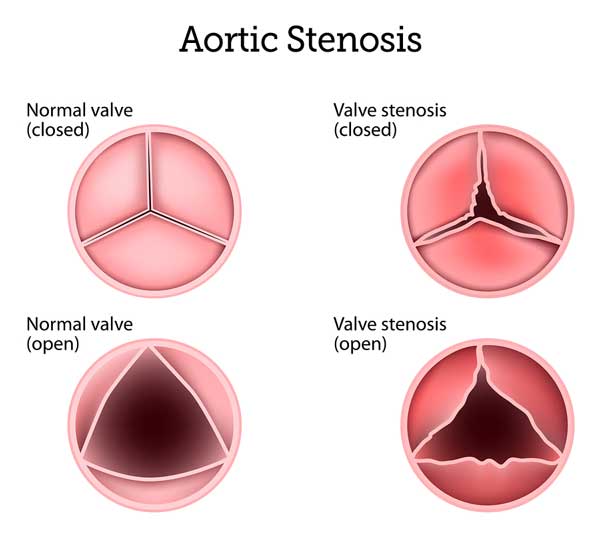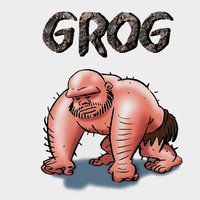Life Expectancy & Heart Valve Disease: What Should Patients Know?
Written By: Adam Pick, Patient Advocate, Author & Website Founder
Medical Expert: Joanna Chikwe, MD, Chair of Cardiac Surgery at Cedars-Sinai Medical Center
Published: July 26, 2021
Heart valve disease can be debilitating and life-threatening for patients diagnosed with severe valvular disorders including aortic stenosis and mitral regurgitation. Thankfully, there are surgical and transcatheter procedures to treat this insidious disease that kills 25,000+ people annually in the United States alone.
To learn how heart valve operations extend the life and quality-of-life of patients, we interviewed Dr. Joanna Chikwe, Chair of Cardiac Surgery at Cedars-Sinai Medical Center in Los Angeles, California. As you may know, Dr. Chikwe has dedicated her career to the research and the treatment of valvular disease using minimally-invasive techniques. At HeartValveSurgery.com, Dr. Chikwe has successfully treated many patients in our community including Wendy Spector, Mark Kimball and Sophie Arguello.
Key Learnings About Life Expectancy & Heart Valve Disease from Dr. Chikwe
Here are the key learnings from Dr. Chikwe’s interview about life expectancy and heart valve disease.
- Dr. Chikwe has dedicated her career to the research and treatment of heart valve disease using minimally-invasive techniques. Dr. Chikwe has performed over 2,000 cardiac procedures of which most included heart valve repair and heart valve replacement operations. Dr. Chikwe’s research has focused on aortic, mitral and tricuspid valve disease.
- The two main types of heart valve disease include stenosis (a tight or narrow valve) and regurgitation (a leaking valve). Both stenosis and regurgitation impact the flow of blood through the heart and body. Ultimately, stenosis and regurgitation can lead to heart damage, heart failure and death.
- The symptoms of heart valve disease include feeling winded, breathless, fatigued, occasional chest pain, dizzy and fainting. Patients with severe heart valve disease can be asymptomatic which is critical for patients to understand. As Dr. Chikwe states, “Patients can be asymptomatic even though they have severe valve disease. That’s important because we’re not doing surgery to make those patients feel better. You might be able to get through five sets of tennis. How are we going to improve on that? We’re trying to improve on that by making sure you live longer and you live without major problems like stroke, atrial fibrillation, or heart failure.”
- While severe heart valve disease is fatal, most types of valvular disorders can be treated safely and effectively.
- For mitral valve regurgitation, a mitral valve repair surgery will bring the patient back to a “near normal” or “normal” life expectancy.
 Mitral Regurgitation
Mitral Regurgitation
- For aortic valve stenosis, an aortic valve replacement is a very common procedure. Replacements are a great option that include a tissue valve or a mechanical valve. Tissue valves typically last 8 to 10 years in younger patients and 12-15 years in older patients. Generally, patients who receive a tissue valve do not require the use of blood thinners. If an aortic valve replacement wears out, a TAVR could be used during a non-invasive “valve-in-valve” procedure that would not require an incision to the patient’s chest or ribs. A mechanical valve replacement could last many decades. However, patients require a blood thinner to reduce the risk of strokes on the mechanical valve.

- For aortic valve repair, there is variant data about life expectancy. However, Dr. Chikwe believes that if the patient has aortic regurgitation, a patient may want to consider finding a skilled surgeon to perform an aortic valve repair.
- When Dr. Chikwe is planning surgery for a patient with heart valve disease, she always considers any additional cardiac conditions the patient may have including atrial fibrillation, coronary artery disease and aortic aneurysms. These are called comorbidities.
- It is important to understand that complications may occur after a heart surgery. A common complication that Dr. Chikwe often sees is atrial fibrillation. Given the risks of atrial fibrillation, Dr. Chikwe and her team aggressively correct an abnormal heart rhythm in the hospital after heart valve surgery.
- The number of surgical re-operations is decreasing for patients. Transcatheter techniques (TAVR, TMVR, TMVr) are providing interventional cardiologists and surgeons an opportunity to fix a heart valve without an incision to the patient’s chest or ribs. However, it is very important that patients seek out a specialized cardiac center that focuses on complex re-operations using either surgical or transcatheter approaches.
- The biggest “stumbling block” specific to life expectancy and heart valve disease is that patients are not aware of the benefits of a repair versus a replacement. The stumbling block for patients is finding the right surgical team to perform a safe and effective heart valve repair that can provide the patient the best chance at a long and healthy life. Here is a video in which Dr. Chikwe address the benefits and different approaches of mitral valve repair procedures.
Many Thanks Dr. Chikwe & Cedars-Sinai!!!
Many thanks to Dr. Chikwe for taking the time to educate our patient community about life expectancy and heart valve disease. We also want to thank the entire Cedars-Sinai team for taking such great care of patients from the HeartValveSurgery.com community!
Related Links:
- See Dr. Chikwe’s Interactive Surgeon Profile
- Mitral Valve Repair: Different Approaches for Different Patients with Dr. Chikwe
- Dr. Chikwe Answers Female Patient Questions About Heart Surgery
Keep on tickin!
Adam
P.S. For the hearing impaired members of our community, we have provided a written transcript of this interview below.
Video Transcript:
Adam Pick: Hi, everybody, it’s Adam with HeartValveSurgery.com. This is a very important surgeon question and answer session all about life expectancy and heart valve surgery. I am very excited to be joined by Dr. Joanna Chikwe, who is the Chair of Cardiac Surgery at Cedars-Sinai Medical Center in Los Angeles, California. During her fantastic career, Dr. Chikwe has performed thousands of cardiac procedures, of which most have involved some form of heart valve repair or heart valve replacement procedure. Dr. Chikwe, as always, it’s great to have you with us today.
Dr. Joanna Chikwe: Great to be with you, Adam.
Adam Pick: Dr. Chikwe, we’ve got lots of great patient questions that came in for you about life expectancy and heart valve disease. First, I wanted to take a big step back and help the patients out there understand what an important part of your practice the research, the studying, and the procedures you’ve been focused on specifically about heart valve disease. Can you help the patients understand how important this is to you?
Dr. Joanna Chikwe: My main focus in heart surgery has been valvular heart disease. My research for over two decades has been focused on mitral, aortic, tricuspid valve disease. That’s really formed my practice. Now, when I sit down with patients in the office and we plan surgery, I can bring a lot of what I’ve learned in research to that conversation. This is the research that’s informed how you choose your surgeon, the questions you might ask that surgeon, your choice of procedure, the timing of your procedure, and how you do after that procedure. I’m confident it’s helped patients have those conversations with other surgeons.
Adam Pick: Dr. Chikwe, it’s great to hear that your time doing the research is not only helping your practice but the practice of surgeons and cardiologists all over the world. Thank you for that work. I want to start by just having a really big and open conversation about heart valve disease. For someone who might just be diagnosed or maybe a family member who is watching a video for the first time about heart valve disease, can you help them understand, what is a heart valve disorder?
Dr. Joanna Chikwe: Everyone has four valves in their heart. Heart valve disease is a huge spectrum that goes from just having risk factors for problems with those valves to having to talk to a surgeon about repairing or replacing those valves because they’ve become so diseased.
Adam Pick: Given that spectrum of all the different types of valve disease that are out there, is there a fundamental problem or two problems that you see across all those different types of disease?
Dr. Joanna Chikwe: Really, you can think of the problems that might affect one or more of your heart valves in terms of two kinds of challenges. Maybe the valve is too tight. That’s stenosis. Maybe the valve leaks. That’s regurgitation. Some valves have both, but most of them fall into one of those two camps.
Adam Pick: I’ve got tight valves; I’ve got leaky valves. It sounds like blood flow is the big issue here in and throughout the heart. Is that true, Dr. Chikwe? If so, what kind of symptoms could patients have?
Dr. Joanna Chikwe: That’s absolutely true, Adam. The job of the valves is to control the flow of blood so that it goes in one direction throughout the heart. When the valves get too tight, the heart has to force the blood through tighter holes. When the valves leaks, half of the blood is going forward in the right direction, but half is going backwards in the wrong direction. That means your heart has to work twice as hard as normal to do the same job.
Both of those scenarios mean that your heart initially gets stronger, it’s like training a muscle, but eventually, your heart starts to weaken. How might you feel that? People commonly complain of feeling winded, feeling breathless, fatigued, occasionally chest pain, and sometimes dizzy or even fainting when they start to exercise.
Adam Pick: This is a very serious, potentially symptomatic disease. Can patients be asymptomatic?
Dr. Joanna Chikwe: Great question; yes, patients can be asymptomatic like you feel fine even though they have severe valve disease. That’s really important. That’s important because we’re not doing surgery to make those patients feel better. You might be able to get through five sets of tennis. How are we going to improve on that? We’re trying to improve on that by making sure you live longer and you live without major problems like stroke, atrial fibrillation, or heart failure.
Adam Pick: Dr. Chikwe, given all those very serious risk factors, I’ve got to ask you the big question that patients often have, which is, is heart valve disease fatal?
Dr. Joanna Chikwe: If you remember one thing today, it’s this: yes, severe heart valve disease is fatal. Severe heart valve disease has a solution. For most patients, there’s an option that can treat that, and treat it safely and effectively, and get you back to a near-normal life expectancy and quality of life.
Adam Pick: Dr. Chikwe, I’m sure our patients out there are wondering now which type of valve disease and procedures can lead me to a normal life expectancy. Can you talk about maybe some of the variances you might see in your research and literature about life expectancy after a procedure?
Dr. Joanna Chikwe: The most dramatic difference in restoring life expectancy after heart valve surgery is in the mitral area where if you can repair a prolapsing valve well, that restores near-normal if not normal life expectancy; whereas if you replace that valve, you’ve definitely improved life expectancy compared to not doing anything at all, but it’s not going to be as normal as if you’d repaired the valve.
Adam Pick: Dr. Chikwe, it’s great to hear about the mitral valve and the near-normal status you can get there for life expectancy. What about over on the aortic valve? Can you talk about how – maybe we start with the aortic valve replacements. What is the expectancy for a patient who needs a replacement?
Dr. Joanna Chikwe: Aortic valve replacements is one of the commonest operations we do. One of the reasons is you can’t really repair a stenotic aortic valve. Replacements are a great option. You have two choices, broadly speaking. One is a tissue or animal valve replacement, which in younger patients last about 8 to 10 years, in older patients, probably about 12 to 15 years. You generally don’t need to take a blood thinner. When it wears out, it could be replaced by a valve inserted through the artery in your leg, so you wouldn’t need second-time surgery.
The other choice is a mechanical valve replacement. That would probably last many decades. A handful of patients might need it replaced. The downside of that is that you need to take a blood thinner to reduce your risk of forming blood clots in the valve that could cause strokes.
Adam Pick: Dr. Chikwe, very helpful. Now, let’s talk about aortic valve repair, which we’re hearing about more and more these days. Can you share about life expectancy for that procedure?
Dr. Joanna Chikwe: I think we could argue about life expectancy and aortic valve repair until the cows come home because there’s so much different data. The bottom line is if I had aortic regurgitation, I’d want to try and find a surgeon that could repair that valve because I know it will minimize my need to take blood thinners. It will hopefully minimize my risk of stroke and hopefully give me the longest distance from surgery without needing any other intervention on my valve.
Adam Pick: Dr. Chikwe, what are maybe some of the other considerations that patients need to think about before having that initial surgery done?
Dr. Joanna Chikwe: The three big other considerations that come into play when we’re planning valve surgery are atrial fibrillation. If we can treat that at the time of the valve surgery and ensure that patient is free of atrial fibrillation, that’s a huge improvement both on quality of life and hopefully length of life. The second thing is coronary artery disease. Some patients do need bypasses to treat blockages in their coronary arteries at the time of valve surgery. The third thing is aneurisms. If we’re dealing with an aortic valve, particularly in younger patients, aneurysms are surprisingly common. They can be safely fixed at the time of the aortic valve surgery.
Adam Pick: So important for the patients to hear this information, Dr. Chikwe, about the co-morbid diseases associated with valve disease. I’ve got to ask you, true or false: at the time of surgery, some of those cardiac disorders are under-treated?
Dr. Joanna Chikwe: That’s absolutely true; however, sometimes that’s the right thing to do. If you’re a younger, fitter patient, it makes absolute sense to be more aggressive about treating all of the cardiac comorbid conditions at the time of surgery to maximize your long-term survival, but if you’re a bit older and frailer, it makes more sense to do an efficient operation that concentrates on the life-threatening valve lesion. You may be better off leaving some of the other comorbidities alone.
Adam Pick: Dr. Chikwe, a real understanding of a heart valve procedure is like all procedures, there could be complications. Are there any common complications after heart valve surgery that may impact life expectancy?
Dr. Joanna Chikwe: Probably the commonest complication after heart surgery is atrial fibrillation. Because we know about its impact on life expectancy, we are very aggressive about preventing it and treating it. Most patients who experience atrial fibrillation in the hospital, and that might be about 20 or 30% of patients, will go home free of atrial fibrillation because we’ll have corrected it.
Adam Pick: Dr. Chikwe, I love how you and the team at Cedars are so aggressively going after AFib for your patients. Got to ask you again, getting back to life expectancy, what role will a reoperation or a re-do have for patients with valve disease?
Dr. Joanna Chikwe: The thing to remember is that a small number of patients will need reoperation. It’s getting smaller because we can so often now do this through transcatheter techniques, not surgery. The second thing to remember is go to an experienced center for your reoperation. It is technically more challenging. It requires an experienced team, including an ICU that’s there 24/7. That will really maximize your chances of doing just as well as you did the first time around.
Adam Pick: Dr. Chikwe, I’ve got to ask you for the patients, are there any misconceptions about life expectancy and heart valve surgery?
Dr. Joanna Chikwe: This isn’t a misconception as much as a huge stumbling block faced by most patients with mitral, aortic, or tricuspid regurgitation who really will benefit from the repair rather than a replacement. The stumbling block is finding the right surgical team because my research has shown enormous variation in the ability of surgical teams to perform a safe and effective valve repair when that’s what’s going to give you the best chance of a long and healthy quality of life.
Adam Pick: Dr. Chikwe, I cannot thank you enough for taking time away from your very busy practice there at Cedars-Sinai in Los Angeles and helping the HeartValveSurgery.com community learn about life expectancy, heart valve disease, and the procedures used to correct it. Thanks so much, Dr. Chikwe.
Dr. Joanna Chikwe: Thank you, Adam. It’s been a pleasure.





